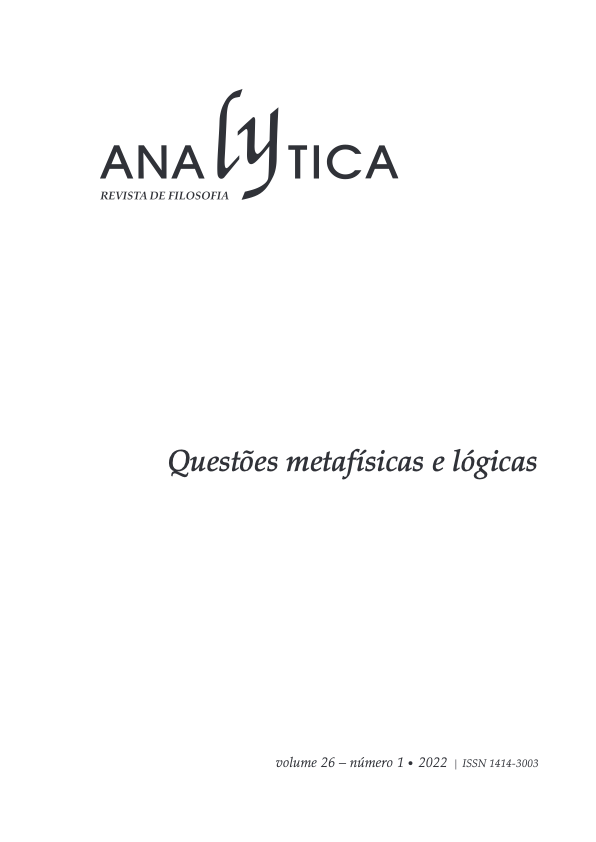Completude e perfeição em Aristóteles
DOI:
https://doi.org/10.35920/1414-3004.2022v26n1p4-17Resumo
Resumo: A noção de teleion é examinada por Aristóteles no capítulo 16 do livro Delta da Metafísica, o livro em que discrimina os diferentes sentidos que certas noções possuem, todas com interesse filosófico. No tocante à noção de teleion, dois são os sentidos básicos, perfeição e completude, mas um terceiro uso também termina por também se sobressair, que exploraremos aqui em termos de seu uso como superlativo relativo ou absoluto em relação à noção de perfeição. O objetivo do presente texto consiste em estudar a aplicação destes diferentes sentidos na Ética de Aristóteles, na esperança de ganhar alguma luz a respeito de certos temas ainda fortemente controversos.
Palavras-chave: perfeição - completude - felicidade - superlativos absolutos e relativos - ética aristotélica
Abstract: Aristotle examines the notion of teleion in chapter 16 of Metaphysics' Delta, the book in which he discriminates the various senses certain words of philosophical interest have. There are basically two senses of teleion, being complete and being perfect, but a third one is also pinpointed, as this paper endeavours to show when Aristotle considers the use of superlatives corresponding to the notion of perfection, either as relative or as absolute. The aim of this paper is to study the application of these three different senses in Aristotle's Ethics and to see to which extent their distinction can cast some light on certain hotly disputed issues of Aristotelian ethics.
Keywords: perfection - completeness - happiness - absolute and relative superlatives - Aristotle's ethics
Downloads
Referências
Ackrill, John. (1974) ‘Aristotle on Eudaimonia’, Proceedings of the British Academy 60: 339-359.
Berti, Enrico. (2017) Aristotele – Metafisica. Bari: Editori Laterza.
Bodéüs, Richard e Stevens, Annick. (2014) Aristote – Métaphysique Delta. Paris: Vrin.
Bodéüs, Richard. (2014) Aristote – Œuvres: Éthiques, Politique, Rhétorique, Poétique, Métaphysique. Paris: Pléiade Gallimard.
Bonitz, Hermann. (1992) Commentarius in Aristotelis Metaphysicam. Hildesheim: Georg Olms Verlag.
Cope, Edward. (1877) The Rhetoric of Aristotle. Cambridge: Cambridge University Press.
Destrée, Pierre e Zingano, Marco. (2014) Theoria – studies on the status and meaning of contemplation in Aristotle’s Ethics. Louvain-la-Neuven: Peeters.
Hackforth, Reginald. (1952) Plato’s Phaedrus. Cambridge: Cambridge University Press.
Hardie, William. (1965) ‘The Final Good in Aristotle’s Ethics’, Philosophy 40: 277-295.
Hardie, William. (1968) Aristotle’s Ethical Theory. Oxford: Clarendon Press. (2nd. ed.: 1980).
Hardie, William. (1979) ‘Aristotle on the best Life for a Man’, Philosophy 54: 35-50.
Irwin, Terence. (1985; 1999) Aristotle – Nicomachean Ethics. Indanapolis: Hackett.
Kirwan, Christopher. (1971) Aristotle – Metaphysics Books Γ, Δ and Ε. Oxford: Clarendon Press.
Rapp, Christof. (2002) Aristoteles Rhetorik. 2 vols. Berlin: Akademie Verlag.
Ross, David. (1924) Aristotle’s Metaphysics. Oxford: Clarendon Press.
Tricot, Jules. (1986) Aristote – La Métaphysique. Paris: Vrin.
Viano, Cristina. (2021) Aristotele – Retorica. Bari: Editori Laterza.
White, Stephen. (1990) ‘Is Aristotelian Happiness a Good Life or the Best Life’, Oxford Studies in Ancient Philosophy VIII: 103-143.
Zingano, Marco. (2017) Aristóteles – Ethica Nicomachea V 1-15 Tratado da Justiça. São Paulo: Odysseus Editora.
Downloads
Publicado
Como Citar
Edição
Seção
Licença
Copyright (c) 2024 Marco Zingano

Este trabalho está licenciado sob uma licença Creative Commons Attribution-NoDerivatives 4.0 International License.
Os autores que publicam nesta revista concordam com os seguintes termos:
- Os autores mantêm os direitos autorais e concedem à revista o direito de primeira publicação, com o trabalho simultaneamente licenciado sob a Licença Creative Commons Atribuição-SemDerivações 4.0 Internacional (CC BY-ND 4.0), que permite a redistribuição, comercial ou não comercial, desde que a obra original não seja modificada e que seja atribuído o crédito ao autor.
- Os autores têm autorização para assumir contratos adicionais separadamente para distribuição não-exclusiva da versão do trabalho publicada nesta revista (ex.: publicar em repositório institucional ou como capítulo de livro), com reconhecimento de autoria e publicação inicial nesta revista.
- Os autores têm permissão e são estimulados a publicar e distribuir seu trabalho online (ex.: em repositórios institucionais ou na sua página pessoal) a qualquer ponto antes ou durante o processo editorial, já que isso pode gerar alterações produtivas, bem como aumentar o impacto e a citação do trabalho publicado (Veja O Efeito do Acesso Livre).






